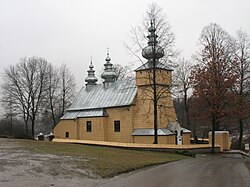Binczarowa
Binczarowa
Білцарьова, Biltsariova (in Rusyn) Більцарева, Bil’tsareva (in Ukrainian) | |
|---|---|
Village | |
 Saint Dimitr Orthodox Church | |
| Coordinates: 49°34′N 20°28′E / 49.567°N 20.467°E | |
| Country | |
| Voivodeship | Lesser Poland |
| County | Nowy Sącz |
| Commune | Grybów |
| Elevation | 597 m (1,961 ft) |
| Population | |
• Total | 1,250 |
| Time zone | UTC+1 |
| • Summer (DST) | UTC+2 |
Binczarowa [bʲint͡ʂaˈrɔva] (Rusyn: Білцарьова, Biltsariova; Ukrainian: Більцарева, Bil’tsareva) is a village in southern Poland. It is parallel to the stream known as Binczarce.[1]
History
[edit]Binczarowa was first mentioned in Polish history in 1365, in a decree of Casimir the Great, under the name Bibyczareban, which forced the city of Grybów to give up its rights to the surrounding forest.[2] In 1531, the Rusyn Ivan Trukhanovych (Polish: Iwan Truchanowicz) obtained the town and Polish nobility from Sigismund I the Old.[3][4]
After the First Partition of Poland in 1772, it was part of the Galician district of Grybów, and part of the Austro-Hungarian Empire. It was the birthplace of Jaroslav Kacmarcyk (1885-1944), president of the Lemko-Rusyn Republic, and of Metodyj Trochanovskij (1885-1947), who published a Lemko grammar. It was briefly independent from December 5, 1918, until March, 1920, as part of the Lemko-Rusyn Republic (Ruska Narodna Respublika Lemkiu, or Ruska Lemkivska Respublyka).
After World War II, it was depopulated by the Polish government in Operation Vistula in 1947.[5]
Geography
[edit]Binczarowa is a Lemko village in the western Lemkivshchyna. It occupies a mountain valley in the Polish commune of Grybów, county of Nowy Sącz, Lesser Poland Voivodeship. It is situated along a stream known as the Binczarce,[1] a tributary of the Poprad. It lies between the towns of Florynka to the east and Bogusza in the west.
Culture and Religion
[edit]The town is the site of St. Dymitr's Church, built in 1760. The town is the site of a large World War I cemetery.
References
[edit]- ^ a b "Dusza Łemka" [Lemko Soul] (in Polish). Retrieved 22 December 2009.
- ^ Piekosiński, Franciszek, ed. (1876). Kodeks dyplomatyczny Małopolski/ Codex Diplomaticus Poloniae Minoris [Code of Malopolska] (in Latin). Vol. 3. Kraków. OCLC 168884435.
{{cite book}}: CS1 maint: location missing publisher (link) - ^ "Miesięcznik heraldyczny" [Monthly Heraldic] (in Polish). 1911: 176. OCLC 32011930.
{{cite journal}}: Cite journal requires|journal=(help) - ^ Stadnicki, Aleksander (1848). "1531 Bielczarowa". O wsiach tak zwanych wołoskich na północnym stoku Karpat [The so-called Wallachian villages on the northern slopes of the Carpathians] (in Latin and Polish). pp. 88–90. OCLC 234342322.
- ^ Best, Paul J.; Moklak, Jarosław (2002). The Lemko Region, 1939-1947 : war, occupation and deportation. Kraków, New Haven: Historia Iagellonica Press and Carpatho-Slavic Studies Group.

